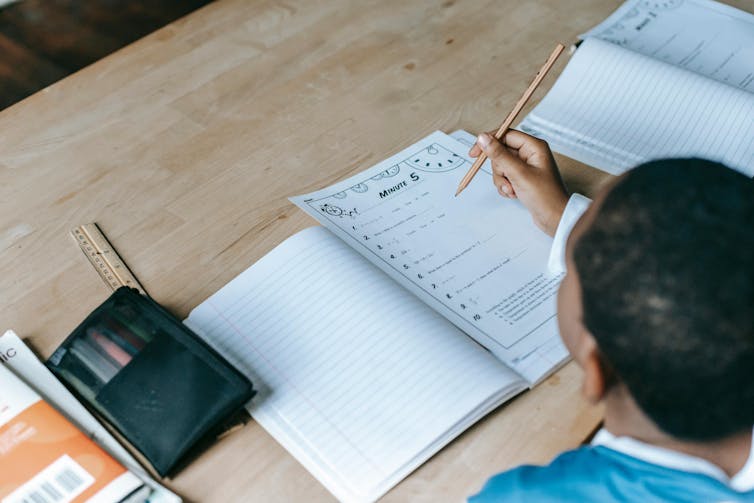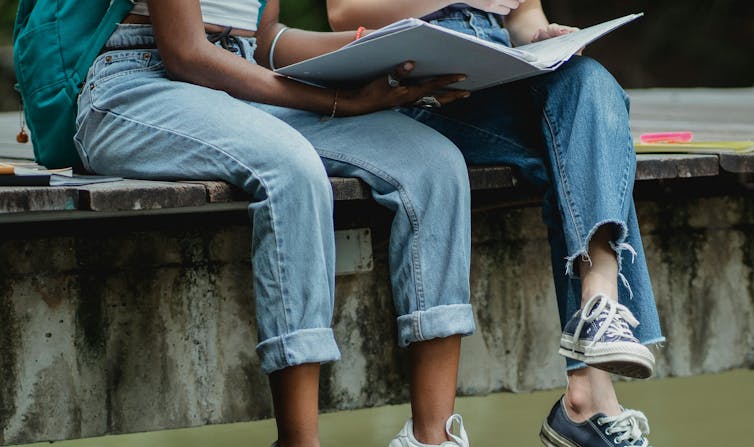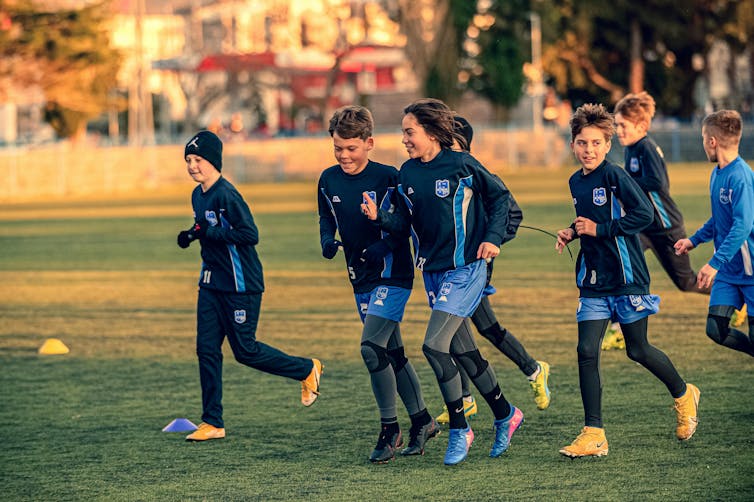But as last year’s disability royal commission found, this does not mean students with disability are fully included in their classrooms, school activities and playgrounds.
Over the past seven years, we have have surveyed and interviewed more than 100 students with disability, as well as parents, carers and teachers, as part of our research on students with disability in mainstream schools.
The students we talked to were aged between eight and 18. Here are ten things these students, their families and carers want teachers to know.
1. I can tell you what works (and what doesn’t)
Students with disability have a lot of experience overcoming barriers. They are experts about their needs and goals. But we found they are often not consulted by their teachers about what helps them at school.
As a high school student with low vision told us:
In primary school […] I had a teacher who wanted me to get a scribe or wanted me to write with a pen. She thought she knew best. It wasn’t the best. So, I think listening to the student is the most important part.
A parent of a high school student also explained:
Listen to and ask questions of the students. Don’t come with a preconceived idea of what a vision impairment is. Come willing to learn and to hear from the student how things impact them. It’s all about the [teacher] attitude and asking the kid ‘look if you can’t access anything you just make sure you let me know’.

Katerina Holmes/ Pexels, CC BY
2. Have high expectations
All students need to take risks to be able to discover, learn and grow. This is known as the “dignity of risk”.
Our research told us students with disability have the same goals for further learning and employment as their peers. So they need to take part in the same activities as their classmates and develop skills necessary for an independent future.
A parent of a Year 11 student said:
Students with disability are going to be working in a competitive job market so they need to be prepared for a level of productivity that is the same or better than their peers.
3. I am more than my disability
For some students, their disability is primary to their identity. For others, it is one of many aspects that makes them unique. Either way, students want their teachers to know them as a student with interests, skills, and goals, not just a “student with disability”.
As one parent explained, a delicate balance is required:
you want to normalise [the impairment], but not normalise it too much, because it’s not nothing. But it’s something that can be managed.
4. I don’t want to stand out
All students like to fit in and do what their peers do. So sometimes students with disability probably won’t tell their teacher if they need help.
One student who lost central vision when he was nine explained how his feelings about his disability can change.
[I] go back and forth with acceptance and then depression, anger and denial. I’m never, never, fully okay with it. So, I think depending on how mentally strong I feel, I’m much more open to things. And if I’m, like, really upset, I just don’t want anything to do with any of it.
He also explained how he arranged via email with his teacher to sit at the back of the class so other students would not notice how much he had to zoom in on his screen.
I’m self-conscious of how much I have to zoom in. And I don’t really want people seeing that because people say stuff and I don’t need that in my day.

Zen Chung/ Pexels, CC BY
5. My parents may need to advocate for me
Until students are old enough, parents are their main advocate. Parents and carers have a huge wealth of information about their child’s abilities and impairment, and want to help.
As one parent of a child in high school with low vision told us:
I suppose you are always advocating. It’s part and parcel when you’ve got a child with a disability, probably more so than for your other children.
6. Talk to the people who help me
Students and their families told us it was important for teachers to work out what is needed and how to solve potential issues at the very start of the year. In other words: be proactive and don’t wait for things to go wrong.
One student told us how an advisory teacher who specialises in helping students with disability gave their regular teacher tips on how to help them in maths.
Instead of writing equations on the board my teacher [now] adds them to OneNote [a note-taking app] so it is accessible to me. Then all the other students have access to it as well.
7. I may miss school sometimes
Some students with disability see a variety of medical professionals and therapists. Appointments are made well in advance and are difficult to change.
Sometimes health needs mean students are away from school for extended periods. This means schools need to be patient with absences and help students catch up.
As one parent told us:
Earlier this year my son was away from school for six weeks. The teachers were amazing in organising extensions, liaising with the hospital school, and sent work to him at home when he was feeling better.
8. I need to be included in all aspects of school
Inclusion in the full school curriculum means involvement physically, academically, socially and emotionally. But students with disability are often excluded from things such as physical activity. Teachers may be worried about students getting hurt or be unsure about how to adapt activities.
As one student told us:
I really struggle with sport, like when we play dodgeball and I can’t see the ball. So, I had to hold on to someone’s hand and jump over the ball. It was fun, but I think things should be made more accessible.
Like everyone else, not being able to participate effectively leads to boredom and frustration. This can see some students act out. As one student told us:
At the end of the term the class watches movies and there is no audio description, and I’m just sitting there. Sometimes I sneak my phone out because I’m just so bored.

Alexander Nadrilyanski/Pexels, CC BY
10. I may need special equipment
Students with disability may need special technology or devices such as screen readers, word prediction software or communication boards. These are essential for equitable access and should not be denied because other students do not need them.
A one parent told us:
The school refused to provide a braille machine. I wanted to take it to the Department of Education, but couldn’t, because I worked at the school. That’s why we ended up buying one. The whole time the [school] said ‘no, it’s too expensive, we’re not buying it. We’ve only got one kid who needs it’.
Another parent agreed:
We need a bit more conversation around how different things are [for our children]. Not that they can’t do things. They can do just about everything, but not the way other children do.
Students with disability want their teachers to know that just like every student, they have needs, goals and aspirations. They also have insight and experience that can support their access and participation in mainstream contexts. We just need to listen.
Melissa Cain, Senior Lecturer in Inclusive Education and Arts Education, Australian Catholic University and Melissa Fanshawe, Associate Professor, School of Education, University of Southern Queensland
This article is republished from The Conversation under a Creative Commons license. Read the original article.









